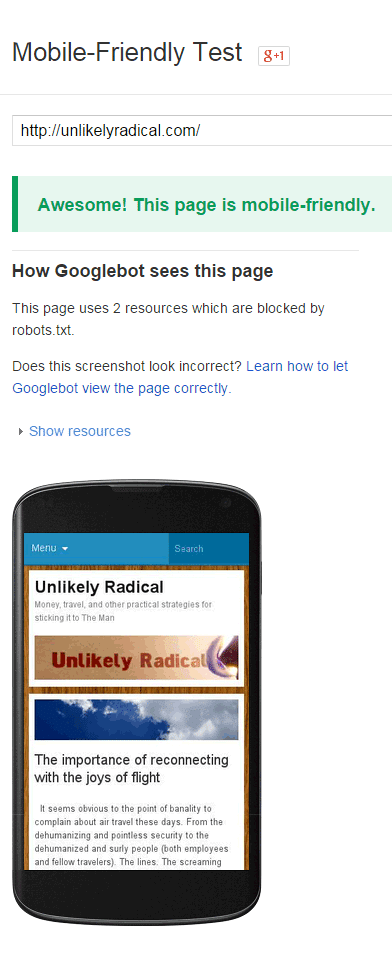Back in Februrary, the wizards at Google dropped this small bombshell:
Starting April 21 [2015], we will be expanding our use of mobile-friendliness as a ranking signal. This change will affect mobile searches in all languages worldwide and will have a significant impact in our search results. Consequently, users will find it easier to get relevant, high quality search results that are optimized for their devices.
Hidden in the positive-sounding press release was a negative implication: they were going to start penalizing websites that weren’t “mobile-friendly”. Another way of looking at this is that they want websites to adhere to “responsive design” principles, so that the content of the page can automatically change based on the device used to access it. Popular media, almost inevitably, started calling this “mobile-geddon“.
Now that the date has passed, it’s worth looking at the ramifications of this that go beyond just whether a site looks good on a phone.
Quick curmudgeonly aside to all web developers: Is it just me, or does “responsive design” often just mean “looks equally terrible everywhere”? I digress…
Table of Contents
The non-responsive life
I have to be honest, I read about this change and got pretty annoyed, mainly because the prospect of having to redesign my site (or pay someone to do same) held less than zero appeal.
I tested my site against Google’s “mobile-friendly test” site, and unsurprisingly, it came up as Failed. But I knew this, as I’ve seen what my site looks like on other people’s phones. It looks like this site, but on a small screen.
But, alas, this would not do. And while it’s not personally relevant to me for my own interaction with this site, I can understand and totally respect why it may be important to others.
I searched around (using Google) and found some forums talking about the problem. One forum mentioned that if you’re using WordPress (which I am), there was an extension that you could install that would make your site mobile-friendly. Called Jetpack, it contained a raft of useful utilities. I actually already had Jetpack installed. This was promising.
Does the Easy Button exist?
I’ve worked in technology basically all of my professional life, and if there’s one thing I’ve learned there, is that there usually isn’t an easy way to do most things, aside from a narrowly-prescribed set of options. Where websites are concerned, all the more so. I lost interest in web design right around the time I was told that it was bad form to put tags in upper case.
<CENTER><B>Whatever.</B></CENTER>
Nevertheless, I fired up my Jetpack console and wandered around its many functions. One of which, true to form, was a check box for “Mobile Theme”.

Shrugging, I checked the box and reloaded my site. Nothing changed; nothing broke. Good so far.
Then I went back to Google’s test site and plugged in my URL. It grinded for a bit and then spit out the news:
I passed!

Somehow the program had converted the graphics and text in such a way that it worked just fine. I have no idea how it did it.
But I danced a little jig at this surprisingly positive turn of events. Take that, Google! If I’m going to have low search rankings, it’s going to not be because Google…says…so…
Oh wait, actually, it still is.
Our non-evil overlords
The importance of this experience has nothing to do with SEO or search rankings or anything like that. It’s a reminder at how reliant we are on one company for our information.
With people using searches as their first-line method of information retrieval, and with basically everyone using Google for all of their searches, that means that we have a classic Single Point of Failure problem: Google controls what information we see. If they choose to hide a website for whatever reason, you will most likely not find it.
This is a problem. No one entity should have that much power. It’s like that time when Carl Icahn, the investor, made a tweet about Apple, which caused the company to increase in value by over $12 billion dollars. That’s not just crazy, that’s wrong.
Luckily, there are options for searching, although none of them are truly optimal right now. But here’s something to consider: You don’t have to use Google for search.
Duck!
Did you know that there is a search engine that not only uses an entirely different algorithm from Google, but also very clearly states its intent not to track your searches? (You did know that Google tracks your searches, didn’t you?)
This search engine is called DuckDuckGo.

While I’ll admit that their search results just aren’t as good as Google’s right now, you can search anonymously and without concerning yourself on whether Google will change what it deems to be important today or tomorrow.
Most of us in the world have lots of freedom on what we can search for and read online, but let us never forget that there still are gate-keepers. Doing what we can to get around them is our duty as informed citizens.
But in the meantime, enjoy the “new” mobile site! (And thanks, Jetpack!)
Have you seen my site on a mobile device? How does it look? Let me know if anything looks off to you.


